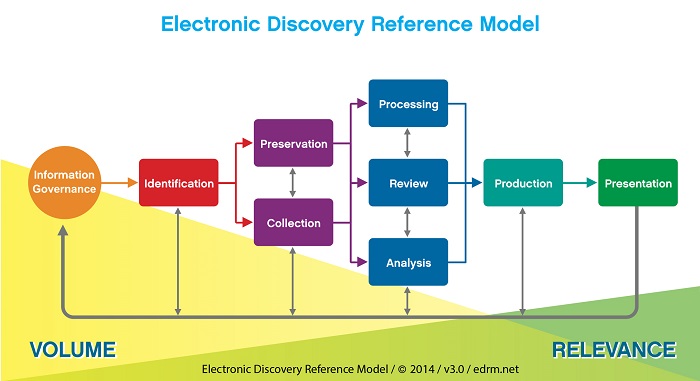https://www.epiqglobal.com/en-gb/thinking/ediscovery/faq/ediscovery-101
What is Electronic Discovery (eDiscovery)?
What is Electronic Discovery (eDiscovery)?
The eDiscovery Process
Electronic discovery, or eDiscovery, is a process in which a collection of evidence is inspected to find content responsive to a particular legal matter or dispute – including litigation, government investigations, or regulatory reviews such as Hart-Scott Rodino Second Requests in the U.S. or Supplementary Information Requests (SIR) in Canada. Evidence can take on multiple forms, including hard copy documents, audio/video recordings, electronically stored information (ESI) such as emails and social media content and more.
The eDiscovery process typically follows a series of steps, represented in concept by the Electronic Discovery Reference Model (EDRM).
eDiscovery Early Case Assessment
Early case assessment refers to estimating risk (cost of time and money) to prosecute or defend a legal case. In terms of eDiscovery, early case assessment can be performed on a case-by-case basis by eDiscovery experts, or there are early case assessment and eDiscovery software platforms that can more easily automate the process for organizations with heavy litigation loads.
eDiscovery Forensics
The eDiscovery forensics portion of eDiscovery involves the forensically sound process of identifying, preserving, collecting, analyzing and reporting on electronically stored information which may be relevant to a legal matter. eDiscovery forensics teams and practices can help to recover information that is hidden, deleted, disguised or stored on damaged media. eDiscovery forensic collection services can be executed on-site (i.e., at a client office or location) or remotely, depending on the need given a host of multijurisdictional regulations and/or case-specific requirements.
eDiscovery Collection
eDiscovery data collection involves the extraction of potentially relevant ESI from its native source (a server, database, email inbox, desktop, mobile device, cloud server, archive, etc.) into a separate repository which is maintained for a specific legal matter. eDiscovery collection also involves the collection and maintenance of what’s known as metadata – which is data that describes other data, such as the date and timestamp of an email, or the creation date of a file.
eDiscovery Predictive Coding
eDiscovery predictive coding, also known as technology-assisted review (TAR), is a type of machine learning technology that uses input from a human reviewer to help identify responsive or important documents. It prioritizes documents by responsiveness before document review begins, allowing lawyers to review the most responsive documents first in order to make decisions on case or matter strategy earlier, and therefore reduce time and money spent reviewing documents irrelevant to a legal matter.
eDiscovery Document Review
A critical component of eDiscovery is document review. It involves lawyers or a team of lawyers combing through documents, ESI, and even audio data, and identifying which are relevant to a particular matter and which are not. Often, law firms and organizations choose to outsource eDiscovery document review services to a company with the capacity and expertise to perform large document review projects quickly, efficiently and defensibly.
eDiscovery Consulting Solutions
eDiscovery is a complex process and often requires both legal and technical expertise to successfully complete from start to finish. Many corporations, law firms and other organizations choose to employ eDiscovery consultants to help them ensure they meet regulatory requirements, manage risk, reduce costs and more.
